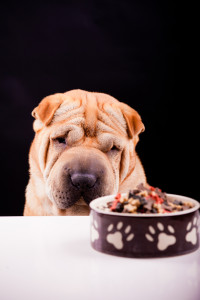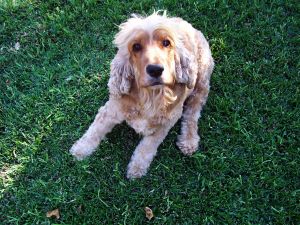 If you’re a first-time dog owner, learning what is healthy for your dog to ingest can seem like a daunting task. Fortunately, by being aware of what is safe in your pantry, and what is not, you can not only prevent your dog from becoming ill, but provide relief in times of pain and discomfort.
If you’re a first-time dog owner, learning what is healthy for your dog to ingest can seem like a daunting task. Fortunately, by being aware of what is safe in your pantry, and what is not, you can not only prevent your dog from becoming ill, but provide relief in times of pain and discomfort.
What not to give your dog
Many foods are healthy for us, and it may seem surprising to learn that they are bad for dogs. According to the ASPCA, avocado leaves, fruit, and seeds all have toxic potential. In dogs, sensitivity to avocado flesh can often result in diarrhoea, while the pit comes with the additional, serious risk of obstructing your dog’s intestinal tract. Grapes and raisins might be one of your favourite snack between meals, but have been linked to kidney failure in dogs, which in extreme cases can lead to death (macademia nuts can also lead to similar instances of toxicoses, though symptoms in this case will typically subside after a few days). Even onions and garlic, those popular cooking ingredients contain compounds that can affect your dog’s health. Be aware of concentrated forms of either of these, as eating larg, or strong amounts of either of these can cause severe damage to your dog’s red blood cells.
Some of the more unhealthy treats we enjoy can be equally hazardous if ingested by dogs. Live yeast, especially in raw bread mix, can bloat in your dogs stomach and cause severe respiratory distress. As it multiplies in the warm interior of the stomach, it produces alcohol which in the worst cases, can result in severe alcohol poisoning. When it comes to alcohol, it’s best to keep your dog as far away as possible. Your dog is far more sensitive to alcohol than you are, and even small amounts can lead to quick and dangerous intoxication. Even chocolate, that most tasty of treats, should never be given to your dog. The darker it is, the greater the chance it will cause toxicosis, thanks to greater concentrations of caffeine and theobromine, both of which can lead to vomiting, muscle tremors, seizures and death.
Like humans, dogs don’t always know what is best for them to eat. Even if your dog looks especially attracted to what you are eating, remember that these common household foodstuffs can present a variety of hazards to your dog’s health. If you suspect your dog may be suffering from having eaten any of the products mentioned, seek immediate advice from your vet.
“People foods” safe for your dog
Don’t worry, it’s not all doom and gloom; there are still several healthy foods that you and your dog can share. Yoghurt is a great source of protein, the more active bacteria the better. There is plenty of essential dietary fibre to be found in pumpkin and sweet potato. Green beans are a good source of plant fibre, and oatmeal a good source of soluble fibre. Eating healthy food can even help improve your dogs appearance. Grooming services are well complimented with a diet that includes flax seed and fatty fish like salmon, which provide excellent sources of omega-3 acids, helping to keep your dog’s coat nice and glossy. Consult with your local or online pet store or grooming service to find out more about how a healthy diet can encourage the growth of strong, shining hair.
If you’re worried about what to give your dog as a treat, then apples are the way to go. Full of vitamins, and sweet and crunchy, your dog is guaranteed to love them. If your dog is in need of a protein boost, cooked whole eggs can also be used as tasty training treats.
Sharing your food with your dog can be great, but make sure you don’t overdo it; giving your dog too much of your food can make him or her ill and overweight. “People foods” should not make up more than 25% of your dogs diet. Make sure to also buy dog food designed specifically for your dogs needs.
So what if your dog is sick, what then?
Just like us, dogs constantly encounter the odd stomach ache, headache or cold. When it looks like your dog is in discomfort, it can be useful to remember that their aches and pains can be treated by some medications you use, that can be equally as effective, in suitable doses on your dog.
For example, Pepto Bismol can relieve an upset stomach and combat diarrhoea. If your dog is having the opposite problem, and appears to be suffering from constipation, a few tablespoon of common mineral oil can loosen up the bowels and help the digestive system. If your dog is in basic pain, aspirin can provide basic pain relief and lessen joint inflammation. Most of us have some Robitussin for cold and flu in the cupboard, especially over the winter. If your dog is coughing or wheezing, a teaspoon of Robitussin can ease a sore and inflamed throat. Remember, human medication can help relieve any pain your dog is suffering from, but do not give greater dosages than recommended.
When it comes to your dog and consumption, health and safety is of the utmost important. Use common sense, and remember that your dog’s stomach is sensitive. If you are unsure about anything your dog has consumed, make sure to seek medical attention from your specialist.
—
This is a post by Ashley Williamson. Ashley is a freelance writer and an occasional guest-blogger and a full time pet lover. When she is not working she likes to travel and read as much as she can. If you have any question feel free to leave a comment.






Pumpkin is really good for constipation. Great tips and advice.
Maggie
I guess you never realized that apples, in excess, will also ferment into acohol in the dog’s digestive tract and cause poisoning. Hey Ashley, your ignorance is showing. Perhaps you should stick to pop culture and home decorating ‘infotainment’.
Comments are closed.